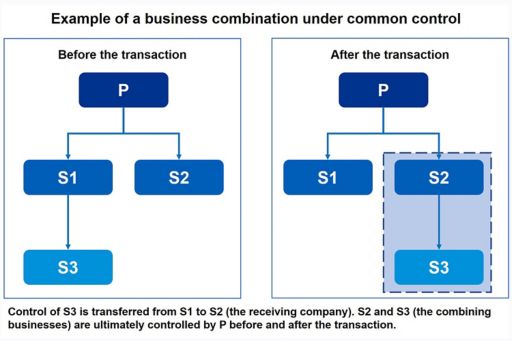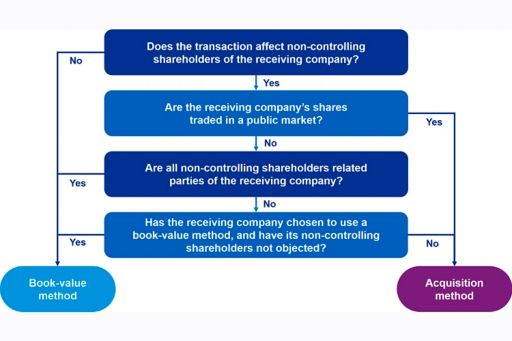2 December 2020 (Updated 17 November 2023)
There is no guidance in IFRS® Accounting Standards for business combinations under common control – i.e. transactions in which the combining businesses are ultimately controlled by the same party both before, and after the combination – as shown in the diagram below.
These transactions are outside the scope of IFRS 3 Business Combinations and significant diversity has emerged in how the receiving company accounts for the transaction in its financial statements – some companies use the acquisition method (i.e. apply IFRS 3) and others use a book-value method.
The International Accounting Standards Board’s (IASB) discussion paper proposed reporting requirements for these transactions, which aimed to reduce diversity and improve comparability and transparency.
The IASB’s decision to discontinue the project means that the gap in IFRS Accounting Standards for these transactions will continue to exist. Diversity will remain as companies continue to develop and apply their accounting policies.
Would the receiving company use the acquisition method or a book-value method?
The IASB’s two possible measurement methods included:
- the acquisition method (i.e. applying IFRS 3); and
- a specific book-value method.
Under the proposals, the method the company uses would depend on the type of transaction.
The acquisition method would be used for transactions that affect non-controlling shareholders because those transactions are similar to business combinations in the scope of IFRS 3. However, the IASB proposed certain exceptions to this rule – e.g. if the company’s shares are not publicly traded and the non-controlling shareholders are related parties of the company.
The book-value method proposed would be used for all other transactions because such transactions only move economic resources within the group and are not like those covered by IFRS 3.
The IASB’s proposal is summarised in the following flowchart.
Which book values would be used?
Although the acquisition method is set out in IFRS 3, IFRS Accounting Standards do not specify a book-value method and do not define how such a method would be applied. Currently a diverse range of book values are used in practice, including using the transferred company’s book values and the controlling party’s book values. These book values often differ – e.g. if the transferred company had previously been acquired from a third party.
The book-value method that was proposed by the IASB would require the receiving company to measure the assets and liabilities received using the book values of the transferred company, not the controlling party’s book values.
Would pre-combination information be restated?
No. The IASB proposed to prohibit the restatement of pre-combination information. This means that the financial information of the transferred company would be included in the financial statements of the receiving company prospectively – i.e. from the date of the transaction.
This would have represented a change from current practice for some companies.
Update – Project discontinued
In November 2023, the IASB decided to discontinue its project on business combinations under common control (it published subsequently a project summary explaining the reasons for the decision). This means that the gap in IFRS Accounting Standards will remain and diversity will continue to exist. Companies will need to continue to develop accounting policies for these transactions and ensure robust disclosures to communicate their impact. Insights into IFRS® provides our latest thinking in this area with practical examples of some of the approaches applied in practice.
© 2024 KPMG IFRG Limited, a UK company, limited by guarantee. All rights reserved.




